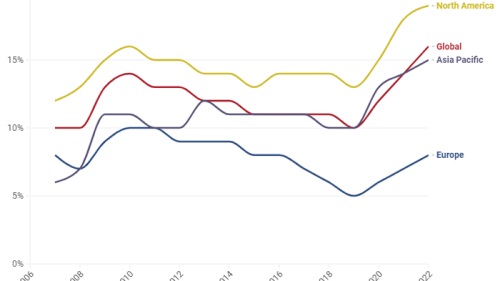The hotel industry in Japan is evolving, with new lodging models emerging, some of which incorporate elements of the burgeoning sharing economy. A panel of real estate and hotel experts at the ULI Japan Fall Conference, held in Tokyo in November, discussed the “capsule hotel” and other models in Japan.
George Nicholas, global head of hotels at Savills, outlined the latest trends in the Japanese and global hotel market, noting that “Japan has a tremendously rich history of hospitality” and that the oldest continuously operating hotel in the world is in Japan. Nishiyama Onsen Keiunkan has been operated by the same family since 705 A.D.
Nicholas argued that, worldwide, the hotel market is diverging away from the middle ground into the high-end and budget hotels. “Investors and hotel companies are looking for quick rollout and delivery. The quickest and fastest route to market is by going in low and filling the market and filing your product line with easy-to-deliver hotels. At the high end, there is less of a corporate style and more trophy investments.”
Moderator Fred Uruma, chief executive of Touchstone Capital Management, said the keyword in Japanese hotels today was “lifestyle.” Aya Aso, chief executive of hotel management company Savvy Collective, said that a key element of the lifestyle hotel was a sense of shared experience and the opportunity to meet like-minded people. Increasingly, hotels in Japan are offering smaller rooms but more shared amenities, such as cafés and lounges, where guests can interact.
Uruma was slightly skeptical about the desire of hotel customers to mingle with their fellow guests, but Nicholas said: “It might not be what we want, but younger customers are after somewhere to meet, mingle, and share. They just like to hang out together, so it’s very much a ‘birds of a feather’ type mentality.”
Tapping into this trend, the hotel lounge is becoming an increasingly important resource and revenue source for global hotel brands, said Nicholas. “Marriott has introduced the concept of a Great Room that’s more like an airport lounge, where you have all-day dining, grab-and-go coffee in the morning, and drinks when you come back from work after a hard day. Or, there will be a top-floor lounge where they charge a premium per person and can use the space for meetings.”
Aso added that lifestyle hotels did not regard shared space as revenue-free space, but rather as a utility that guests were prepared to pay for, along with individualistic design.
Nicholas, however, noted that investors are often not keen on idiosyncratic hotel design. “If you go too far down the unique design route and the operator fails or the concept fails, then you are left with a lot of cost to remodel. Investors like to see a relatively safe product.”
Automation is becoming increasingly important in hotels worldwide, with more offering virtual check-in and the ability to open rooms with a smartphone. More Japanese budget and lifestyle hotels are offering these services, Aso said.
Japan’s famous “capsule hotels” also feature shared spaces, such as bathrooms, for travelers on a budget, as well as rooms that just accommodate a single traveler. However, new iterations of this model are emerging, such as First Cabin, whose president, Tadao Kimachi, took part in the discussion. First Cabin offers rooms that are a 2.1-meter cube—larger than a capsule hotel, but far smaller than a standard business hotel. These hotels are mainly aimed at single travelers or couples on a budget, but First Cabin is now offering larger rooms in a new Niseko Hotel, where each room will accommodate up to four guests.
Kimachi said that operators such as First Cabin were beneficial to the real estate industry because they could use lower-grade office buildings with minimal conversion costs. “If you have odd-shaped plots or buildings, this type of hotel works well,” he said.
A major disrupter for the hotel business has been the emergence of room-sharing sites such as Airbnb. In Japan, the room-sharing market took a heavy blow in June when a new law forced hosts to register with local government and display their registration number on listings. This forced Airbnb to take down two-thirds of its listings, virtually overnight.
However, the room-sharing market—known as minpaku in Japan—has enormous potential, said Shinichi Tatebayashi, chief executive of Squeeze, a company that runs a management system for minpaku properties and boutique hotels. He said that Japan was short of minpaku properties, especially at the higher end of the market, since most were catering to families on a budget. However, there is demand for luxury minpaku apartments.
As the number of tourists grows—the number of inbound visitors to Japan rose 20 percent to 28 million in 2017—more foreign tourists are visiting provincial cities, and rooms rented in private homes will help these cities meet demand, Tatebayashi said.




